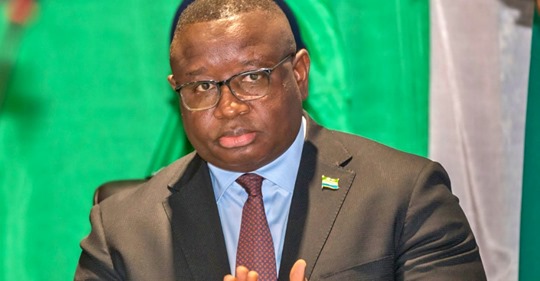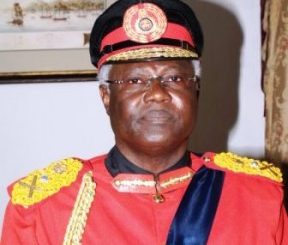
Letter from England : SLPP Cannot Intimidate Sierra Leone

By Winston Ojukutu-Macaulay Jnr
A FEW weeks ago, after the incident in Tombo, I was talking to a fellow journalist, over coffee, about leadership in Africa. Immediately, he wanted to know what was “the problem with your country?” He then alluded to the fact that Freetown was once known as the Athens of West Africa, which had made it “intellectually stimulating, culturally beautiful, and morally upright. Today, all that is gone, replaced with backwardness and your people living in denial”.
I thought of that conversation this past weekend, as events unfolded in Makeni, more so because of Sierra Leoneans across the world expressing their opinions on the rights and wrongs of the killings of young men and boys by the government security forces in the name of “maintaining law and order in the face of organised lawlessness”.
On April 3, 2018, after a tight run-off election, the Opposition candidate and former military junta leader, Julius Maada Bio, was declared the winner and he was immediately sworn in as the new president. He told Sierra Leoneans and the world: “This is the dawn of a new era. The people of this great nation have voted to take a new direction.”
Appealing for national unity, Bio noted: “We have only one country, Sierra Leone, and we are all one people.” With some parts of the country in shock while others were in jubilation, Bio promised at a jam-packed Mammy Yoko Hotel that he would pursue “national cohesion and disciplined leadership”.
How distant that moment of optimism seems now. Though the president did promptly start with the battle against corruption, the following months have been devoured by issues and government policies that have called into question the quality and capacity of the SLPP Paopa government.
This situation is now creating a dilemma for Sierra Leoneans in and out of the country. And many of them, both supporters and none supporters of the SLPP, are saying that the current state of the country has not shown the president at his best.
Veronica Davies, a Sierra Leonean based in the United Kingdom, disclosed to me: “I voted for Bio, and, while I was impressed with him when he started with the corruption Commission of Inquiry, I have been disappointed with him on many social issues.”
Alfred Lewis, a school teacher in Freetown told me that he, too, voted for the SLPP in 2018 but that in recent months he had felt “let down” by President Bio and his government. Stressing that he did not belong to any political party, he expressed concern about the behaviour of the police and military.
He went on to say: “Many people I know and who voted for the SLPP are disappointed in President Bio’s leadership qualities in key areas, but particularly when it comes to peace and stability in the country. “I think there is a reasonable case to be made that he’s lacked the leadership to bring Sierra Leone together,” Lewis pointed out in a telephone conversation recently.
As the events erupted in Makeni and the killings took place, many people were waiting for a measured response from Bio and his government. But none has been forthcoming.
There was none also from those who, in the past, would have rushed to the radio and television to condemn the government. And of course, the general public is divided; some would say deeply polarised or even afraid to speak out.
Can Sierra Leoneans no longer tell right from wrong? Have we all – SLPP, APC, NGC or XYZ – lost our moral compass? I will argue that this is the case. Too many egocentric people no longer care about our core values, the facts, and pre-eminence of the rule of law.
In fact, for many years now our core values as a nation have been devalued. There are too many people who conveniently suffer from blindness, deafness and who are generally selfish. These are attitudes that definitely do not augur well for the progress of the nation.
The reason why slogans such as “New Direction” and “Paopa Salone go better” are still fashionable within the Paopa circles is because Bio is fully aware that politics was dysfunctional in the country when he became president. These days each party panders to its base and as such the media and political activists have correspondingly become polarised. Thus, one could understand why Bio promised to pursue a policy of “national cohesion and disciplined leadership” in the first place.
But the continuing blame game when things go wrong is a lazy governance style that Bio conveniently uses to cover his shortcomings. Today, listening to the Paopa SLPP government officials and supporters, it is clear that the new norm consists of demeaning and disrespectful utterances, or bullying and belligerent behaviour; issues that millions of voters thought they were consigning to the dustbin when they voted for Paopa SLPP in 2018.
Voters are disappointed because the Paopa SLPP government has failed to realise that the behaviour of its activists and the security agencies has become toxic and that this adds to the further degradation of our already damaged values and poor quality of life.
“We are no longer interested in what the APC or any other party or government did in the past. President Maada Bio took an oath to be president of Sierra Leone, that is what matters,” says Dr Solomon Bangura, another very unhappy Sierra Leonean voter.
Political agitators engender anger, hatred and fear, and these “emotional viruses” can easily spread among a vulnerable population through a process known as “social contagion.” These negative emotions insinuate themselves into the social atmosphere, wreaking havoc with people’s thoughts, emotions, and behaviours, Dr Bangura, observed.
“I have been following the various incidents of political conflicts in the Western Area and in the North and I sensed a policy of using the security forces to intimidate and threaten voters, expecting them to be subdued. This is a huge political miscalculation that will backfire in the face of President Bio, when the time comes.
“I don’t want to believe or agree that Sierra Leoneans are afraid or that most of them have lost their moral compass, as suggested by you. I think they are biding their time,” Dr Bangura reiterated during our conversation on Monday.
For me, I find it extraordinary that, in the midst of a national health crisis, Bio could allow innocent young men to be gunned down over a generator; and that as a president who promised “disciplined leadership” he cannot bring himself to express regrets over the loss of lives. And this is not the first time; Sierra Leone is yet to hear any word of regret from Bio about the number of people killed by the security forces with impunity since he came to power in April 2018.
I have always thought that knowledge of history can provide an insight to the present. And that Bio, claiming to be the “Father of Sierra Leone’s Democracy”, with a “Professor of Peace and Conflict” as his Chief Minister and a former head of Peace and Conflict at the University of Sierra Leone as a Cabinet Minister, he would not be ahistorical.
British War time Prime Minister Sir Winston Churchill once warned: “Those that fail to learn from history are doomed to repeat it.” But I think in time, Sierra Leoneans will remind Bio and his Paopa SLPP government and supporters of what Carl Becker (1873-1945), an American historian, once said: “The value of history is, indeed, not scientific but moral: by liberalising the mind, by deepening the sympathies, by fortifying the will, it enables us to control, not society, but ourselves – a much more important thing; it prepares us to live more humanely in the present and to meet rather than to foretell the future.”
Winston Ojukutu-Macaulay Jnr © 2020



